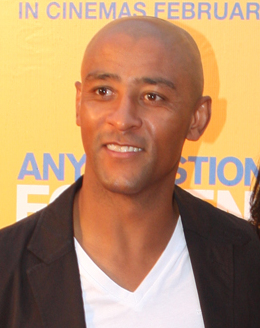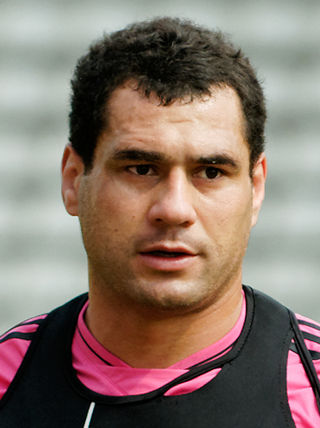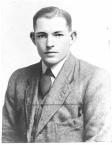Related Research Articles

The Australia national rugby union team, nicknamed the Wallabies, is the representative national team in the sport of rugby union for the nation of Australia. The team first played at Sydney in 1899, winning their first test match against the touring British Isles team.
Patrick William Howard is an ex-head coach at Leicester Tigers and a former Australian rugby union international who played centre or fly-half. He was the General Manager, Team Performance – for the Australia national cricket team.

In the game of rugby union, there are 15 players on each team, comprising eight forwards and seven backs. In addition, there may be up to eight replacement players "on the bench", numbered 16–23. Players are not restricted to a single position, although they generally specialise in just one or two that suit their skills and body types. Players that play multiple positions are called "utility players".

George Musarurwa Gregan AM is a retired Australian rugby union player, and is currently Australia's most capped international player.

Colin Charvis is a former professional rugby union player. A back row forward, Charvis was equally adept as a flanker or at number 8. Born in Sutton Coldfield, England, he captained the Wales national team from 2002 to 2004, and also played for the British & Irish Lions on their tour of Australia in 2001.
Tim Horan AM is a former Australian rugby union footballer. He played for the Queensland Reds in the Super 12, and represented Australia. He was one of the best centres in the world throughout the 1990s due to his attacking prowess, formidable defence and playmaking ability. He became one of only 43 players who have won the Rugby World Cup on multiple occasions.
Michael Patrick Thomas Lynagh, is an Australian former rugby union player who played mainly as a fly-half. Lynagh represented Australia from 1984 to 1995, playing at both inside centre and fly half. Lynagh was capped 72 times for Australia, and was captain from 1993 to 1995. He was the world points scoring record holder when he retired, with 911 points.

George Smith is an Australian retired rugby union player. He was a flanker for 12 years (2000–10,13) at the ACT Brumbies in Super Rugby, earning 142 caps.

John William Smit, OIS, is a South African former professional rugby union player and former chief executive officer of the Sharks. He was the 50th captain of the Springbok rugby union team and led the team to win the 2007 Rugby World Cup. He played most of his senior career as a hooker, but also won 13 caps as a prop, where he had also played for South Africa's under-21 team. He retired from international rugby following the 2011 Rugby World Cup as the most-capped South African player ever, with 111 appearances.
Nicholas Campbell Farr-Jones AM is a former Australian rugby union footballer. His position was scrum-half. Farr-Jones debuted for the Australia national rugby union team during the 1984 Australia rugby union tour of Britain and Ireland, during which the Australia won the grand slam of rugby union when they defeated all four Home Nations. He was voted "Player of the Series" for the 1986 Australia rugby union tour of New Zealand, during which Australia became the sixth team in history to win a rugby Test series in New Zealand. He was appointed captain of the Wallabies prior to the commencement of their 1988 international season. He is probably best remembered for captaining Australia to their the 1991 Rugby World Cup. Farr-Jones retired as captain of Australia after a victory against South Africa in 1992 and temporarily ceased playing international rugby. He came out of retirement in 1993 for the single Bledisloe Cup Test and a three-Test home series against South Africa, following which he retired from international rugby. He now works at Taurus Funds Management, appears as a TV rugby commentator on UK Sky Sports and is the chairman of the New South Wales Rugby Union.

Nathan Sharpe is a retired professional Australian rugby union player. He began his rugby career at the Queensland Reds in 1999 before joining the newly created Western Force in 2006, where he captained the club until his retirement in 2012. He played 116 test matches for Australia, including 20 as captain. His usual position was lock.
Daniel Herbert is a former Australian Rugby Union player, and current Chair of Rugby Australia.

Tom Lawton Snr was an Australian rugby union player, a state and national representative five-eighth who made 44 appearances for the Wallabies, played in 14 Test matches and captained the national side on ten occasions.

Anthony Alexander Shaw is an Australian former rugby union player. A Queensland state and national representative flanker, Shaw captained the national side consistently from 1978 to 1982.
Desmond Michael Connor is an Australian former rugby union halfback who represented internationally both the Australian and New Zealand national rugby union teams. He is an inductee in the Australian Rugby Union Hall of Fame.

Michael Kent Hooper is an Australian professional rugby union player who is the former captain of the Australia national team, the Wallabies. His primary position is openside flanker.
Bryant Timothy Gavin is an Australian former state and national representative rugby union player who played Number 8 for the Wallabies in 47 Test matches in between 1988 and 1996.

Peter George Johnson was an Australian international rugby union player. He enjoyed a long state and international career throughout the 1960s and made 92 national appearances for his country. He captained the Australian side in five Test matches.
Richard James Pickett Marks, is an Australian former rugby union footballer and noted administrator. He played 17 Tests for Australia between 1962 and 1967, and was a captain of Queensland, for whom he played from 1962 to 1972. He served as national coaching director from 1974 to 1995, and was a leading figure in lifting the standard of Australian rugby. He also served on the Board of Queensland Rugby and was an inaugural member of rugby's International Technical Committee and drafter of the Game’s Charter. He received the Joe French Award for his contributions to Australian rugby in 2014, and remains active in debates on governance of Australian rugby. In 2020, he was inducted into the Queensland Sport Hall of Fame. He is the grandfather of Queensland Reds player Curtis Browning.
References
- ↑ "2001 Australian Wallabies squad — British & Irish Lions Tour". rugby.com.au. Australian Rugby Union. Archived from the original on 22 September 2013. Retrieved 17 June 2014.
- 1 2 3 4 5 6 7 8 "2007 Inductee: John Eales". irb.com. 1 December 2007. Archived from the original on 7 April 2013. Retrieved 7 April 2013.
- 1 2 3 National Association of Australian University Colleges Inc Archived 10 June 2007 at the Wayback Machine
- 1 2 "Computershare – Communication Services". Qmtechnologies.com. Archived from the original on 31 January 2013. Retrieved 21 June 2013.
- ↑ "School Building Names" (PDF). St William's School Grovely. Retrieved 27 October 2017.
John Eales Oval – Past student and ex- Australian Wallaby Captain
- ↑ "Statsguru/John Eales/Test matches". ESPNscrum. Archived from the original on 7 April 2013.
- 1 2 3 "Statsguru/Test matches/Australia". ESPNscrum. Archived from the original on 7 April 2013.
- 1 2 "Statsguru/Test matches/Forwards". ESPNscrum. Archived from the original on 7 April 2013.
- ↑ "Statsguru/Test matches/Captains". ESPNscrum. Archived from the original on 7 April 2013. Retrieved 8 March 2017.
- ↑ "14 All Blacks join the exclusive two-time World Cup winners' club". The Independent. 1 November 2015. Retrieved 23 September 2021.
- ↑ Advance.org (2009). Mr John Eales, AM. Retrieved 13 November 2009.
- ↑ "John Eales on Connecting Sports Leadership and Business Success" . Retrieved 28 April 2022.
- ↑ "From the touchline – Put your house on Pumas (not mine)". Rugbyworldcup.com. 11 October 2007. Archived from the original on 14 February 2012. Retrieved 21 June 2013.
- ↑ Conomos, Taya (27 March 2012). "ALO Column: John Eales". Australian Olympic Committee. Retrieved 27 October 2017.
- ↑ "AIEF Ambassadors – John Eales AM". Australian Indigenous Education Foundation. Retrieved 27 October 2017.
- ↑ "John Eales Rugby Excellence Scholarship". Bond University. Retrieved 27 October 2017.
- ↑ Eales, John (2006), Learning from legends / John Eales, Fairfax Books, ISBN 9781921190469
- ↑ Eales, John (2008), Learning from legends. Business / John Eales, Fairfax Books, ISBN 9781921190759
- ↑ "Board profiles" . Retrieved 28 April 2022.
- ↑ "BBC News | Rugby World Cup | Rugby comes first on 'Republican Day'".
- ↑ Tom Decent (9 February 2018). "John Eales' son Elijah to make NSW Premier Cricket first grade debut". The Sydney Morning Herald . Retrieved 28 April 2022.
- ↑ Australian Institute of Sport 'Best of the Best' Archived 17 November 2012 at the Wayback Machine
- ↑ "John Eales". Sport Australia Hall of Fame. Retrieved 25 September 2020.
- ↑ "Queensland's Paul McLean inducted into Wallaby Hall of Fame". redsrugby.com.au. Retrieved 14 October 2013.
- ↑ Colangelo, Anthony (4 December 2020). "Women's T20 side, Eales claim top honours at Sport Australia awards". The Sydney Morning Herald. Retrieved 5 December 2020.